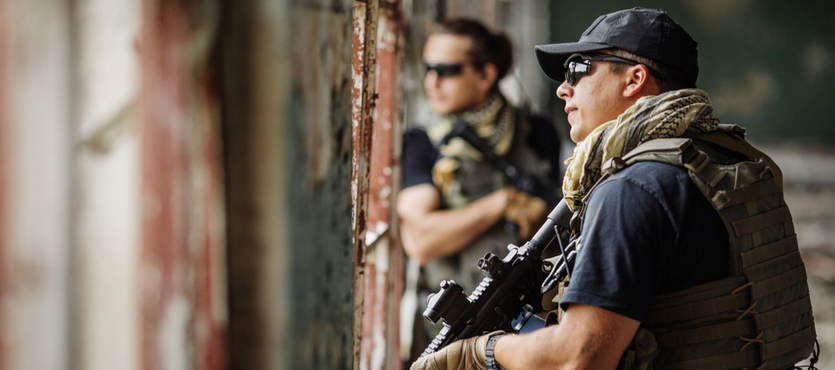As further evidence of the mounting Islamic militant activity in Mozambique, the government recently announced that Dyck Advisory Group contractors, who were slated to stand down in July, would remain in-country through at least the end of 2020.
DAG has lost two aircraft during operations in the country. Additionally, DAG helicopter gunships supposedly fired on civilians during a recent operation. However, DAG contractors also successfully beat back militant attacks in Pemba and supported the government’s productive operations in Macomia and Mocímboa da Praia.
Sources indicate that the contact extension includes a financial upgrade. More money will be available to attract and retain top contractors. The additional funds will also go to additional equipment, such as troop-carrying helicopters.
What is at Stake in Mozambique
Al Sunnah wa Jama’ah, an ISIS-affiliated militant group, has become increasingly active in Mozambique since 2017. Through the first half of 2020, the group has killed almost 500 people in multiple attacks throughout the country, mostly in the strategic Cabo Delgado coastal province and the surrounding areas. In their most recent attacks, these militants have used advanced weapons, like 82mm mortars and 73mm recoilless rifles.
Cabo Delgado is a hotbed for international drug trafficking. Islamic extremists often rely on drug trafficking to finance their operations. A State Department spokesperson recently called instability in Cabo Delgado a security threat that has a nexus to criminality [and] terrorism.”
Economics come into play as well. Total, a French company, recently acquired the rights to the vast natural gas reserves in Cabo Delgado and a pipeline which became operational in 2004. Additionally, Salso, a South African company, recently inked a $1.2 billion deal to build an additional pipeline.
The terrorist group is also mimicking ISIS tactics. Extreme acts like beheadings and kidnappings are now commonplace in many regions.
However, unlike ISIS, Al Sunnah wa Jama’ah is a shadowy, low-profile organization. It does not actively recruit members or post videos on social media. That low profile makes it difficult to track the group’s activities. That’s one area where contractors often shine. More on this below. Al Sunnah wa Jama’ah usually focuses recruiting efforts on poor, disaffected youths. There are many such individuals in Mozambique’s rural villages. Yet another major cyclone recently hit the country, straining the country’s infrastructure and devastating many small farmers.
Further complicating matters, Russian mercenaries are active in Mozambique as well. Frequently, the Wagner Group infiltrates an African country and promises security in exchange for access to the country’s natural resources. Mozambique, like many Central African nations, has significant untapped reserves of natural gas, coal, oil, and other resources.
As a result of all these things, U.S. Africa Command says it is monitoring the situations in Mozambique. To date, no regular U.S. service members are stationed in Mozambique. The American military deterrence presence consists entirely of private military contractors.
Contractor Duties
Generally, U.S. Africa Command only deploys ground troops in response to disasters, like a cyclone or famine. For deteriorating security situations like the one in Mozambique, Uncle Sam relies almost exclusively on private military contractors.
Islamic militants have some sophisticated weapons, but they are no match for the weapons available to Mozambique security forces via South Africa, the United States, and France. Someone must maintain these weapons, and that someone is usually a private military contractor. Much of the military hardware in Mozambique is specifically designed for African environmental conditions. So, its maintenance requires a high degree of technical specialty. Typically, only private military contractors are that specialized.
Additionally, someone must teach Mozambique’s security forces how to use these weapons. Anti-insurgency tactics are important as well, and that is a skill that many African security forces lack. For the most part, government troops fight highly-organized rebels and provide security during difficult periods. Effective anti-insurgency campaigns require more, and contractors know how to translate their experience to local security forces.
Maintenance and training often are not enough. Since the earliest private military contractors in the Revolutionary War, support personnel have always been able to pick up rifles and defend key installations when necessary. That’s an added dimension that many local contractors do not have.
Injury Compensation Available
All these activities put contractors in harm’s way. In the Global War on Terror, there is no “front line” and “rear area.” Any military or civilian area could be attacked at any time. If contractors are injured in either situation, the Defense Base Act usually applies.
Combat-related injuries include enemy action and training accidents. Deployment-related non-combat injuries include falls and suicide bomber injuries. The DBA applies to both combat and deployment-related injuries. Courts have repeatedly held that injured victims must only establish a nexus (indirect connection) between their injuries and their deployments. That is a much lower standard than tort claims or workers’ compensation actions.
Generally, the Defense Base Act applies to all private military contractors who are injured in an overseas war zone. Let us look at these requirements more closely.
A private military contractor is anyone who works for a DoD, State Department, or other government organization. The “military” contractor could also be a paramilitary contractor, as described above. Additionally, the contractor could be a U.S. citizen or a foreign national.
The Defense Base Act applies to all physical injuries. That includes brain injuries, like Post Traumatic Stress Disorder. Contrary to popular myth , PTSD is a physical brain injury as opposed to a processing disorder.
An overseas war zone is any area that has any U.S. military presence. Despite the violence, most people would not consider Mozambique a “war zone.” Legally, however, the shoe fits.
For more information about DBA financial benefits, contact Barnett, Lerner, Karsen, Frankel & Castro, P.A.

